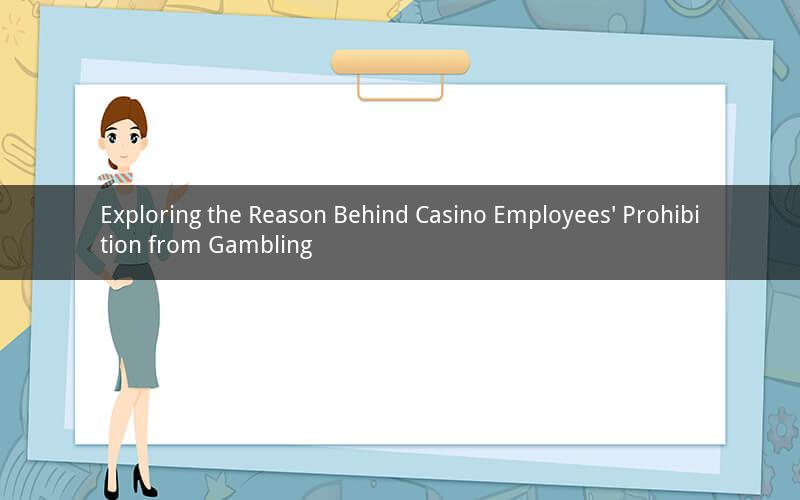
Casino employees are restricted from participating in the very activity they facilitate, which has sparked numerous debates and questions. Why can't casino employees gamble? This article delves into the reasons behind this policy, examining its impact on employees, the casino industry, and the public perception.
1. The Root of the Rule: Ensuring Fairness
One of the primary reasons why casino employees are prohibited from gambling is to maintain fairness. Casinos are built on the principle of providing a level playing field for all participants. If employees were allowed to gamble, it would create a conflict of interest and compromise the integrity of the games.
By restricting employees from gambling, casinos ensure that the outcomes of the games are solely based on chance and not influenced by any inside knowledge or biases. This policy helps maintain public trust in the casino industry and ensures a fair and equitable gaming experience for all players.
2. Preventing Corruption and Insider Trading
Another reason for the prohibition is to prevent corruption and insider trading. If casino employees were allowed to gamble, they might have access to confidential information about the games, such as winning patterns or the frequency of certain outcomes. This information could be used to gain an unfair advantage in the games, leading to corruption and compromising the integrity of the casino.
By prohibiting employees from gambling, casinos eliminate the risk of insider trading and ensure that all players have an equal chance of winning. This policy also helps protect the casino's reputation and prevents any legal or ethical issues that may arise from insider trading.
3. Maintaining a Professional Work Environment
Casino employees are expected to uphold a certain level of professionalism and maintain a neutral stance towards the games. Allowing them to gamble could create a bias towards certain outcomes, which may affect their judgment and ability to perform their duties effectively.
By prohibiting employees from gambling, casinos encourage a more objective and unbiased work environment. This not only benefits the employees themselves but also ensures that customers receive fair and transparent service.
4. Protecting Employees from Financial and Emotional Risks
Gambling can be an addictive and dangerous activity. By restricting employees from gambling, casinos help protect them from the potential financial and emotional risks associated with it.
Employees who are allowed to gamble may develop a gambling addiction, which can lead to financial problems, job loss, and other negative consequences. By implementing this policy, casinos aim to create a healthy work environment and support the well-being of their employees.
5. Enhancing the Overall Gaming Experience
Lastly, prohibiting casino employees from gambling helps enhance the overall gaming experience for customers. When players see that the employees are not taking part in the games, they are more likely to feel confident in the fairness and integrity of the casino.
This policy also promotes a sense of trust and respect between customers and employees, fostering a positive atmosphere within the casino. By ensuring that all participants have an equal opportunity to win, casinos can create a more enjoyable and memorable gaming experience for everyone.
Questions and Answers:
1. Q: How does the prohibition of casino employees from gambling affect the casino's bottom line?
A: The policy does not directly impact the casino's bottom line. Instead, it focuses on maintaining fairness, preventing corruption, and enhancing the overall gaming experience for customers.
2. Q: Can casino employees own stocks in a gaming company?
A: Yes, casino employees can own stocks in a gaming company, as long as they do not have access to confidential information that could be used for insider trading.
3. Q: Are there any exceptions to the rule that prohibits casino employees from gambling?
A: Some casinos may allow employees to gamble on certain non-gaming events, such as sports betting or lottery games, as long as it does not conflict with their duties or the casino's policies.
4. Q: How do casinos monitor their employees to ensure they comply with the no-gambling policy?
A: Casinos typically implement strict policies and procedures to monitor their employees, including background checks, random drug and alcohol testing, and ongoing supervision. Employees who violate the policy may face disciplinary actions, up to and including termination.
5. Q: Is it common for other industries to have similar policies regarding employees and gambling?
A: Yes, many industries have similar policies to ensure fairness, prevent corruption, and protect employees from the risks associated with gambling. Examples include the financial industry, sports betting companies, and other gaming establishments.